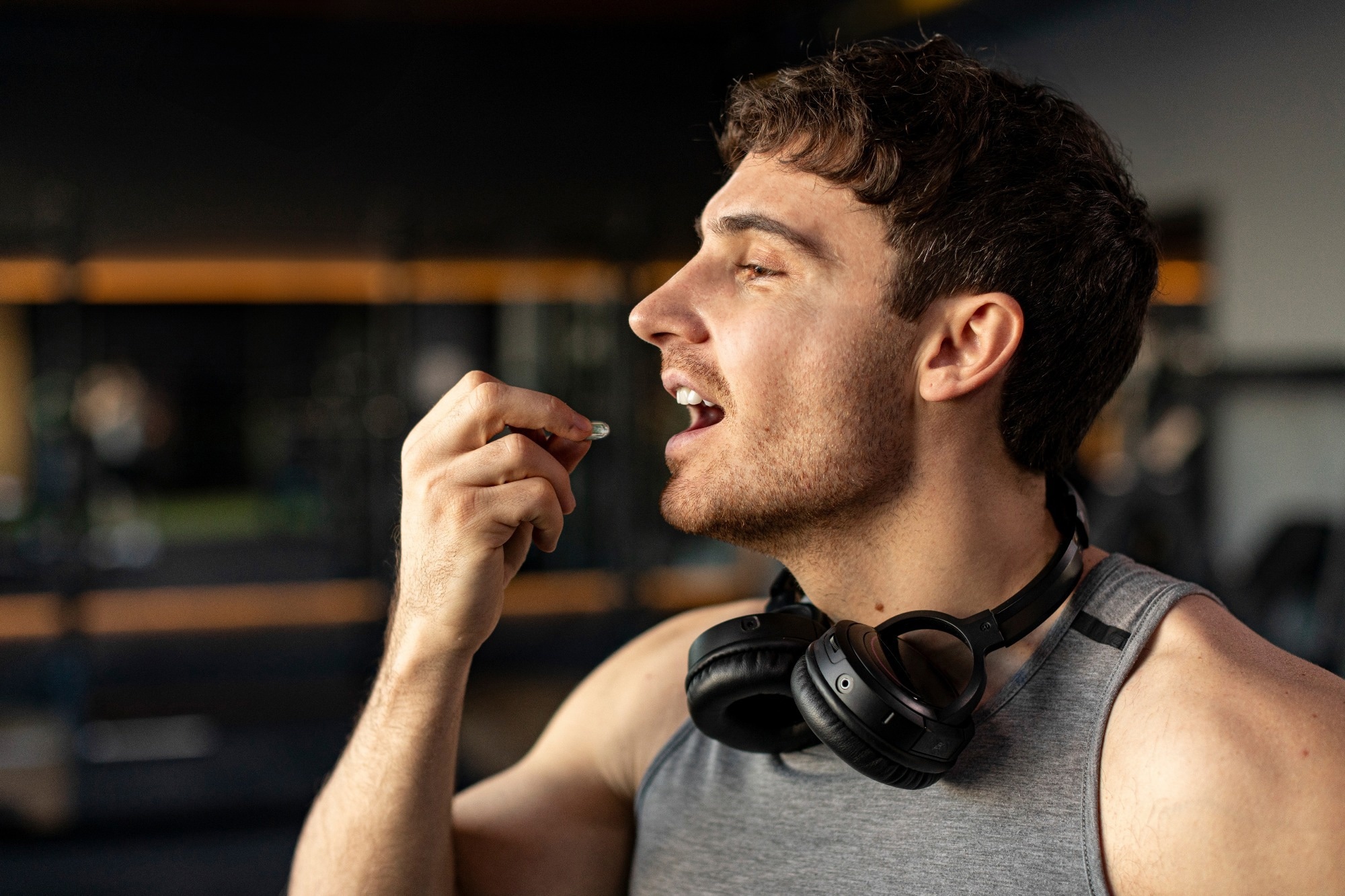EPA- and DHA-rich oils boosted athletes’ omega-3 index and eased exercise strain, but the supplements offered no extra edge in time trial performance.
 Study: Six weeks of either EPA-rich or DHA-rich Omega-3 supplementation alters submaximal exercise physiology in endurance trained male amateurs. Image credit: fast-stock/Shutterstock.com
Study: Six weeks of either EPA-rich or DHA-rich Omega-3 supplementation alters submaximal exercise physiology in endurance trained male amateurs. Image credit: fast-stock/Shutterstock.com
A recent study in Frontiers in Nutrition investigated the potential of EPA-rich or DHA-rich Omega-3 supplements to modify physiological responses to submaximal exercise and evaluate their effects on exercise physiology and performance in endurance-trained males.
Athletes and dietary supplements
Most athletes use dietary supplements to optimize their performance. Previous studies have shown that omega-3 fatty acid supplements may improve endurance exercise adaptations, including exercise efficiency, resting heart rate (HR), and V̇O2 max. Reduced whole-body oxygen consumption and decreased HR during submaximal exercise indicate improved exercise efficiency.
Although the omega-3 index is considered a useful biomarker, it often underestimates the incorporation of omega-3 in target tissues (e.g., cardiac and skeletal muscle). A previous study indicated that 1 in 106 German winter elite athletes demonstrate an omega-3 index greater than or equal to 8%, implying a significant deficiency and an urgent need for increased omega-3 intake.
To date, the actual effect of omega-3 fatty acid supplementation on endurance performance has remained elusive due to heterogeneity in supplementation duration, measures of bioavailability, training status, dose, omega-6 in placebo, EPA: DHA ratio, and performance measure (time trial (TT) vs. time to exhaustion). Many randomized controlled trials use fish oil as the source of omega-3 fatty acids; however, depending on the type of fish oil, the EPA and DHA ratio might vary. Considering the inconsistent results, there is a need for human intervention studies to assess the independent effects of EPA and DHA on relevant outcomes.
About the study
The current double-blinded, block randomized parallel control trial assessed the differential impact of supplementation with EPA-rich fish oil, or DHA-rich algae oil, compared with a true placebo (coconut oil), on the omega-3 index, submaximal exercise responses, such as HR, respiratory exchange ratio (RER), rate of perceived exertion (RPE), and TT performance test. The EPA-rich oil contained 1.8 g of EPA and 1.2 g of DHA, while DHA-rich oil consisted of 2 g of DHA and 1 g of EPA.
The current study hypothesized that six weeks of supplementation would elevate the omega-3 index in DHA-rich algae and EPA-rich fish oil conditions, but not in the placebo condition.
A total of 69 endurance-trained male amateurs associated with swimming, cycling, rowing, running, and team sports were recruited. However, only 55 participants completed the study and were included in the final analysis. All male participants were between 18 and 50, healthy, endurance-trained, and non-smokers. Participants who enrolled in another clinical trial, had a recent or recurring injury, regularly consumed more than two portions of oily fish a week, or took omega-3 supplements were excluded.
Participants were matched in groups of three depending on their sporting discipline, predicted V̇O2max, and body composition. For a proof-of-concept study, participants were given three g/day of either EPA-rich fish oil, DHA-rich algae oil, or coconut oil (placebo) for 41 days. Blood samples were collected before and after the supplementation period.
Study findings
The mean compliance to the supplementation period for the EPA-rich, DHA-rich, and placebo groups was estimated to be 91.3%, 93.8% and 92.3%, respectively. At baseline (pre-supplementation), there were no significant differences in participants’ omega-3 index. The current study demonstrated that six weeks of supplementation with either EPA-rich or DHA-rich omega-3 fatty acids increased the omega-3 index, from levels below 6% pre-intervention to values above 8% post-intervention.
After six weeks of supplementation, the omega-3 index increased in both the EPA-rich and DHA-rich supplemented groups but not in the placebo group. Furthermore, a decrease in the omega-6 content of cell membranes was observed in both the EPA-rich and DHA-rich supplemented groups, but not in the control group.
At pre- and post-supplementation, submaximal HR increased along with the intensity levels in all three groups. After six weeks of receiving EPA-rich and DHA-rich oils, a reduced exercising HR was documented. However, no statistically significant change was observed in the placebo group from pre- to post-supplementation.
The submaximal RPE increased in all three groups as the intensity levels increased from 100 to 200 Watts. A decrease in submaximal RPE was observed from pre- to post-supplementation in the EPA-rich and DHA-rich oil groups. Although the submaximal RER increased in the EPA-rich fish oil group from pre-to post-supplementation, no change was found in participants who received the DHA-rich or the coconut oil control.
Across all participants, a significant moderate inverse correlation was observed between the change in omega-3 index and the change in submaximal HR. Furthermore, a significant inverse correlation was observed between the change in omega-3 index and the change in submaximal RPE. The current study documented a borderline significant inverse correlation between DHA and RPE changes and a significant inverse correlation between changes in EPA and RPE.
Regarding the time required to complete the 24 km TT, participants were significantly quicker post-supplementation than pre-supplementation across all intervention groups. However, the study reported no significant differences in performance gains between the EPA-rich, DHA-rich, and placebo groups. While the DHA-rich group was overall faster than the placebo group, this effect was not linked to supplementation-related improvements.
Conclusions
The findings documented here demonstrate that for the omega-3 index to reach a physiologically meaningful level, a 6-week supplementation with either DHA-rich or EPA-rich omega-3 fatty acids is sufficient. Both EPA-rich and DHA-rich supplementation also lowered submaximal HR, suggesting improved cardiac efficiency, but these physiological changes did not translate into superior endurance performance compared to placebo.
Future studies should ideally include both male and female participants to ensure the findings are generalizable to all sexes.
Download your PDF copy now!